Women’s health hacks
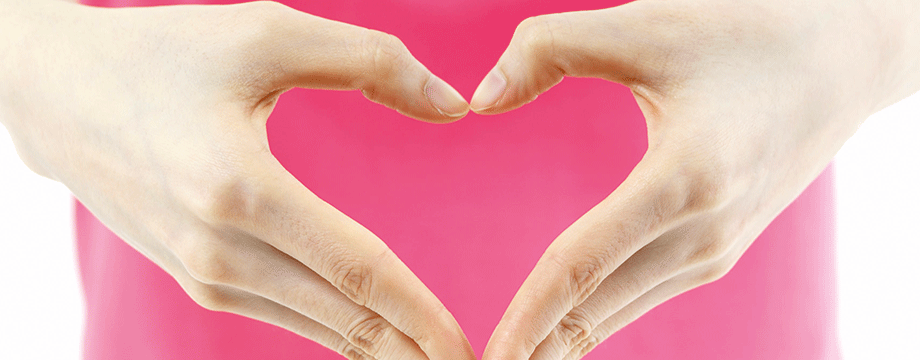
Liz Parry speaks to a range of holistic health experts to get their top tips for the most common women’s health conditions
The problem: PMS
“The symptoms of PMS can vary from mood swings, food cravings and depression to breast tenderness, water retention and bloating,” explains Marianna Sulic, a nutritional therapist working at Cleanmarine (www.cleanmarinekrill.co.uk).
How to help it:
“All high-salt foods and processed meats should be avoided as salt will add to the water retention problem,” advises Marianna. “Good quality proteins, such as fresh fish, eggs, skinless chicken and turkey, cottage cheese and cooked tofu will help regulate your blood sugar levels and support the liver to process hormones. Including soy foods, such as tofu, miso and tempeh into your diet can reduce painful breasts and help balance hormones naturally.
“Omega-3 fatty acids are associated with reducing inflammation in the body and may prevent or alleviate bloating and pain caused by PMS. Krill oil contains a highly absorbable form of omega-3. Look out for products with added ingredients such as rosemary oil, a potent anti-inflammatory herb, B vitamins and isoflavones, which help support better menstrual health and hormone balance. Adding 600-800mg of magnesium daily for the entire month will help reduce symptoms of PMS and keep you calm as magnesium works by naturally relaxing the nervous system.”

The problem: The menopause
“From our late 30s, our bodies gradually begin to produce less oestrogen,” says Ellie Hughes, health consultant at Estroplus. “This transition phase – known as the perimenopause – precedes the menopause when menstruation ceases. Side effects and common symptoms of the menopause can include hot flushes, night sweats, mood swings and vaginal dryness – all of which can leave us feeling not at our best.”
How to help it:
“There are a number of lifestyle and diet changes which can help support a woman’s wellbeing during these changes,” says Ellie. “Isoflavones are naturally occurring compounds known as plant oestrogens found in pulses, legumes, vegetables and cereals. Their chemical structure is similar to that of oestrogen. Experts credit this similarity as the reason why soy isoflavones in particular may help in relieving hormonally based symptoms of menopause such as hot flushes. Look for one-a-day caplets which are formulated with a unique blend of ingredients designed to support wellbeing for women, including B vitamins to aid the reduction in tiredness and fatigue, vitamin B6 which contributes to the regulation of hormonal activity and calcium which contributes to the maintenance of normal bone.”
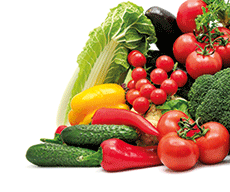
The problem: Hormonal imbalances
“Imbalances of female hormones can give you PMS, endometriosis, fibroids and PCOS,” says Dr Marilyn Glenville, a leading nutritionist and author of Natural Solutions to Menopause, “and then there are all the symptoms associated with the change in hormones at the menopause.”
How to help it:
“Fibre plays a major role in balancing our female hormones,” says Dr Glenville. “The fibre contained in grains and vegetables reduces oestrogen levels and seems to work by preventing oestrogens that are excreted in the bile from being reabsorbed back into the blood. Probiotics are important for your general health but they help to control oestrogen by binding it in the gut and helping your body excreting it efficiently. Aim for one containing 22 billion organisms.”

The problem: Thrush
“Thrush or vaginal yeast infections cause uncomfortable symptoms such as vaginal itching, irritation, discharge and painful urination,” explains Caroline Harmer, Education Director at leading digestive care and cleansing company Renew Life (www.renewlife.com).
How to help it:
“Vaginal thrush is an obvious sign that a woman’s vaginal bacteria are out of balance,” explains Caroline. “Due to the close proximity of the vagina to the gut, it is extremely likely that there are also imbalances in the woman’s gut flora and she is likely to have digestive issues. The most efficient and effective natural remedy is to replenish healthy vagina, urinary tract and gut bacteria at the same time. This may be done by using a unique women’s 10-strain, 50 billion probiotic, formulated to target unwanted organisms, and repopulate dominant vaginal and gut bacteria in one easy-to-take capsule a day.”
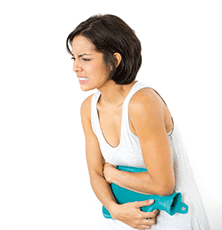
The problem: Painful periods
“Often times menstrual pain happens in isolation, but sometimes there are secondary associated conditions such as hypothyroidism, ovarian cysts, endometriosis, fibroids and uterine infections,” says Sarah Green, Registered Nutritional Therapist and Vice Chair of BANT (www.BANT.org.uk). “If you have particularly strong or unusual cramps you should refer to your doctor to check for other factors.”
How to help it:
“Inflammation, often driven by poor diet, stress and lack of exercise can play a part,” says Sarah. “It can be helpful to load up on vegetables, especially the brassicas (Broccoli, cauliflower, cabbage and sprouts) which contain indole 3 carbinol, which helps us to process excess oestrogen. Green leafy vegetables can boost our magnesium which is a natural muscle relaxant. Good fats from oily fish, avocados, nuts and seeds can support anti-inflammatory pathways in the body. If you are iron deficient you may tend towards heavier periods. If you have too much iron, you could also have heavier periods, so it’s important not to take iron supplements unless prescribed by your doctor. Some find seed cycling can be quite effective for period pains and PMS. Take 1-2 tablespoons of ground flax, chia or pumpkin seeds daily with 1 tablespoon of fish oil in the first half of your menstrual cycle (ie when you start your period). Then sesame or sunflower seeds with 1-2g of evening primrose oil. The fibre from the seeds along with good hydration (generally two litres of water a day) can also help balance hormones by making sure your bowel movements are regular and you are not reabsorbing hormones your body is trying to get rid of.”
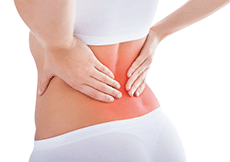
The problem: Osteoporosis
“The risk of osteoporosis increases with age, especially after the menopause when oestrogen levels decline,” explains Dr Marilyn Glenville.
How to help it:
“The most important nutrients for your bones are without doubt calcium, magnesium and vitamin D,” says Dr Glenville, “so be sure that you eat foods rich in these nutrients. Calcium is the key component of bone, and essential for bone health throughout our lives. It is found in dairy products but don’t forget that you can also get plenty of calcium from dark green leafy vegetables, like broccoli, fish with bones, tofu, nuts and seeds. Finally, as well as eating a healthy, bone-building diet a regular exercise programme is crucial for warding off osteoporosis. This is because the more physically active we are, the more bone we will build. Aim for a minimum of 30 minutes exercise five times a week.”

The problem: Bacterial Vaginosis
“Bacterial Vaginosis (BV) is a common complaint in women of child-bearing age and develops when the bacteria that lines the vagina has become unbalanced,” explains Linda Booth, founder of Just For Tummies (www.justfortummies.co.uk).
How to help it:
“It can be an embarrassing condition for a woman due to the strong ‘fishy’ odour that is produced, unlike thrush where there is little odour,” says Linda. “There can also be an excessive abnormal discharge. Such symptoms need checking by a GP to rule out more serious pathology such as a sexually transmitted disease. BV is not a sexually transmitted disease. Take a daily multi-strain probiotic, including lactobacilli strains, to help re-populate the vagina and create a healthy barrier.”
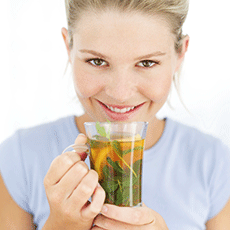
The problem: Urinary tract infections
“Cystitis and urinary tract infections (UTIs) are among the most common types of bacterial infection today,” explains Dr Gras Balaguer, a qualified medical doctor and Technical Director with Cysticlean (www.cysticlean.co.uk). “Up to one in three sufferers of UTIs develop long-term issues with three or more episodes a year. This is life affecting, so prevention is key.”
How to help it:
“In order to support the immune system, a healthy diet is essential,” says Dr Balaguer. “Keeping the urine slightly acidic helps inhibit the growth of infectious bacteria in the urinary tract so including a vitamin C supplement may be helpful. Lifestyle changes are equally important. Poor fluid intake has been shown to be a risk factor for recurrent UTIs so drink plenty of water or herbal teas. Urinating shortly after feeling the need to urinate may also help prevent UTIs. For UTIs associated with coitus, post-coital voiding is important to flush out the urinary tract. Try wearing cotton underwear, avoiding tight-fitting clothing and wiping from front to back to prevent transportation of bacteria from the anus to the urethra. Lastly, most UTIs are caused by E. coli adhering to the bladder wall. Stop the infection gaining hold by taking a high performance natural preventative that inhibits the adherence of the E. coli.”
Read previous Your Health articles here...
Read articles from our latest issue here...